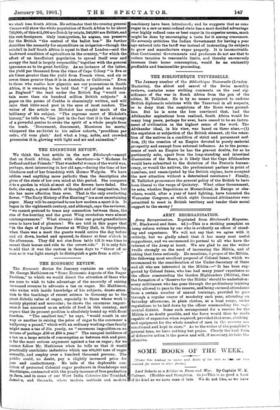THE BIBLIOTHEQUE UNIVERSELLE.
The January number of the Bibliothegue Universelle (London Hachette), the ablest and sanest of the Swiss monthla reviews, contains some striking comments on the real sig- nificance of the war in South Africa from the pen of the editor, M. Tallichet. He is by no means prepared to endorse British diplomatic relations with the Transvaal in all respects, or to deny that the suspicions of the Boers were ground- less. But he is none the less convinced that, had the Afrikander aspirations been realised, South Africa would for many long years, perhaps for ever, have ceased to be an instru- ment of civilisation m the highest sense of the word. The Afrikander ideal, in his view, was based on three aims,—(l) the expulsion or subjection of the British element, (2) the reten- tion of the natives in a condition of strict and permanent serf- dom, (3) the creation of an Empire devoted to purely material prosperity and exempt from external influence. As to the perma- nence of such an Empire he has the gravest doubts, for as he pertinently asks, apart from the long-standing and intestinal dissensions of the Boers, is it likely that the Cape Afrikanders would have submitted to the dictation of the Pretoria bureau- cracy, or would the natives, the predominant partner in point of numbers, and emancipated by the British regime, have accepted the new situation without a determined resistance ? Finally, M. Tallichet pronounces the general policy of the British to have been liberal to the verge of Quixotry. What other Government, he asks, whether Republican or Monarchical, in Europe or else- where, would, after a year of hard fighting, have tolerated the Worcester Congress, at which eight thousand Afrikanders were permitted to meet in British territory and tender their moral support to the enemy ?


















































 Previous page
Previous page